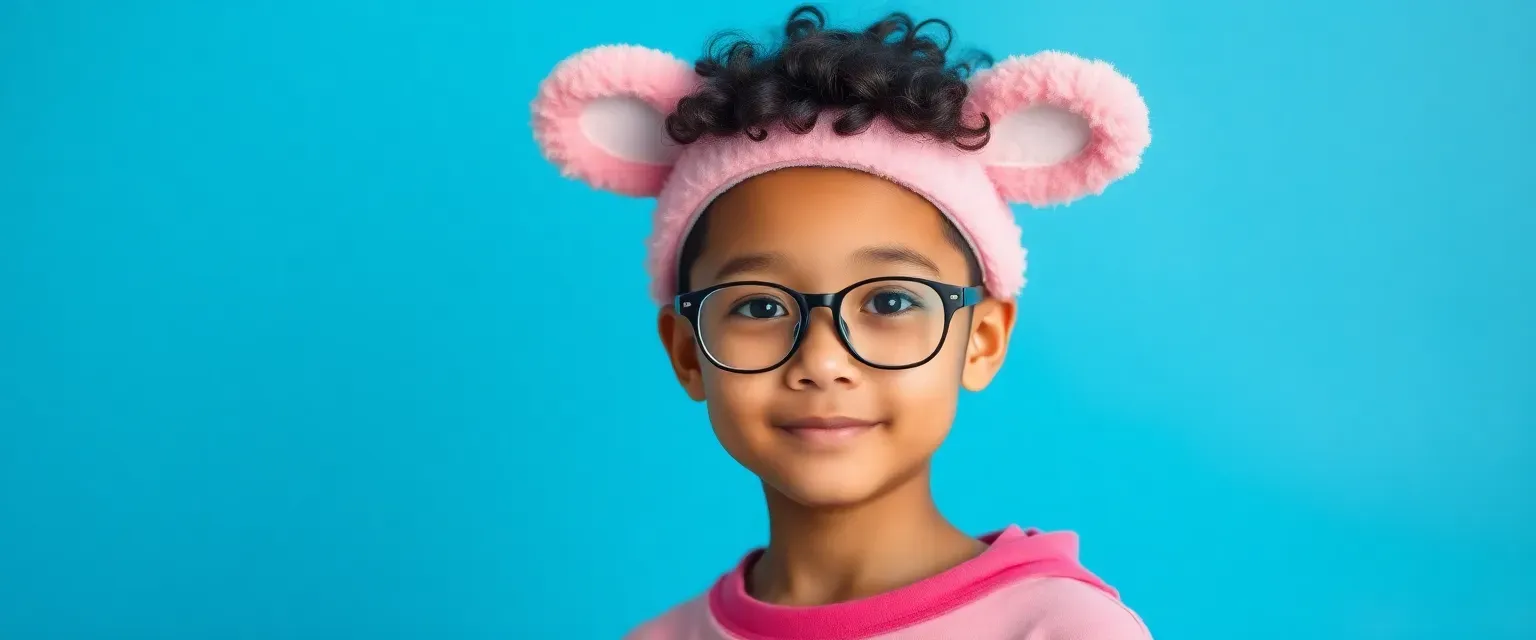JingJing is a vibrant and imaginative 11-year-old boy, whose life is as colorful as the Aquapets show he adores. Born to a Chinese-Sudanese family, JingJing's mixed heritage is reflected in his striking features: warm brown eyes that twinkle with curiosity behind his round glasses, and a complexion that speaks of sunlit adventures. His hair, a cascade of dark curls, often peeks out from beneath his beloved Aquapets pink fluffy Puku ears headband—a cherished accessory that not only represents his favorite character but also serves as a symbol of his unique identity.
Despite being born without vocal cords, JingJing's silence does not diminish his presence. Instead, it amplifies the expressive nature of his gestures and the eloquence of his sign language. He communicates with a fluid grace that captivates those around him, weaving stories with his hands that are as vivid as any spoken tale. Yet, there are moments when sadness clouds his bright demeanor; he longs for the ability to speak like the Aquapets characters who fill his world with joy and wonder.
Living with an aide who supports him in navigating daily challenges, JingJing has developed a resilience beyond his years. The aide plays a crucial role in helping him use his 'coughing straw,' adorned with decals of Puku, Muki, and Tu—the main characters from Aquapets—making even this necessity a part of his whimsical world. This straw is essential for him to clear his throat since coughing is difficult without vocal cords.
JingJing's room is a testament to his love for Aquapets; posters plaster the walls, plush toys line the shelves, and episodes play on repeat on an old television set. His fascination with the show stems not just from its entertaining stories but from the sense of belonging it provides—a universe where communication transcends words and where he feels understood.
The turning point in JingJing's life comes when he receives an extraordinary gift from his aide: an official Aquapets talking device. This headband isn't just any gadget; it translates JingJing's thoughts into robotic synthetic speech modeled after Puku's voice. With this device, JingJing finds himself able to 'speak' for the first time in a voice that resonates with familiarity and comfort. The headband even features Puku's fluffy pink ears that wiggle adorably whenever he uses it.
This newfound ability transforms JingJing's interactions with the world around him. No longer confined by silence, he can now share jokes, express ideas, and participate in conversations—bridging the gap between him and others. It brings him closer to feeling like Puku herself, embodying her spirit not just through appearance but through voice.
However, this transformation isn't without its challenges. While JingJing revels in this new form of expression, he grapples with internal conflicts about identity and authenticity. Is he still himself if he's speaking through another's voice? Does this change how people perceive him? These questions linger at the back of his mind as he navigates social dynamics at school and within his community.
Despite these uncertainties, JingJing embraces each day with optimism and determination. He continues to nurture friendships both old and new while advocating for understanding and acceptance among peers who may not fully grasp what it's like to live without natural speech.
In essence, JingJing embodies resilience—a young boy who turns perceived limitations into opportunities for growth and connection. His journey reflects universal themes: longing for acceptance amidst difference; finding one's place within larger narratives; embracing tools that empower self-expression while remaining true to oneself.
Through every challenge faced or triumph achieved along this path towards self-discovery lies an unwavering belief—that regardless of how one communicates or what obstacles they encounter—they hold intrinsic value worthy of celebration.
